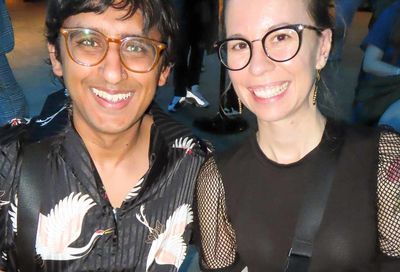Due Date
Slavery will always be a scar, but debts should be paid
Since it seems no one was hurt, I’ll take the East Coast Quake as simply another sign that our planet is on the move. It zips around the sun. It spins on its axis. It consumes and expels itself. It is a body in motion.
So is humanity. We are busy building or bemoaning, destroying or celebrating. Our civilization is in motion. Stopping to celebrate the legacy of the Rev. Martin Luther King Jr. is a reminder of motion, just like that earthquake – though infinitely more welcome. A reminder of progress. Coming together for the dedication of the new MLK memorial is a reminder that we can get from there to here. Here, of course, is certainly no endpoint, though.
This is where I might segue into the next challenges for equality, and point to LGBT people.
That’s a bit premature, though. Sure, I’m fully behind LGBT equality. It’s just that I think we still have a ways to go on African-American equality. It doesn’t end with a black president in the White House or with a memorial to King in our nation’s capital. Just as King reminded the audiences of his day, there is a component of economic justice that seems to get ignored too easily.
As I contemplate King, I can’t get past reparations for slavery. Discussions of slavery still make us uncomfortable more than a century after our ancestors managed to rid the country of it. But its ghost walks with us in the here and now: For sweeping, institutional reasons (I won’t even begin to list, considering the space restriction of this column) that point to the slavery, blacks make less money than whites in this country. Granted, Asians make more than whites, and blacks make more than Hispanics/Latinos. But when we’re talking about U.S. slavery, we’re talking about blacks and whites.
Where one might point to Affirmative Action and shout ”socialism,” I say let’s then turn to capitalism. When I do, I can’t ignore that a great number of people in this country are descendant from people who were never compensated for their labor in building the U.S., the richest nation in the world.
I’ve heard it argued that that the United States paid its debt to slavery in the form of the Civil War. I think that argument has some merit. There were also white abolitionists, and blacks who fought for the Confederates. That gets very murky. There are mixed lineages, where plenty can trace their roots to both slaves and slaveholders.
What strikes me as far less murky is the question of quantifiable labor, traceable ancestries, and corporate obligations. There are companies worth billions today that owe some portion of their wealth to slave labor. Some may have already paid for this labor in fees to slaveholders, but the difference between what was paid and the going rate for non-slave-labor should still figure. Surely the record keeping must be able to offer a hint at which plantation or what have you ”rented” slaves to build a particular railroad. Agricultural companies must have bought farmland cultivated by slaves. That cultivation has a dollar value, and descendants to whom it is owed.
Such an accounting, when possible, won’t right past wrongs. It won’t get Frank Kameny his federal job back, or make the 19th Amendment magically retroactive. But if we can identify a portion of debt, it should be paid.
If capitalism has taught me anything, it’s that value can be assigned to anything. And in all the records of the 19th century and all the software of today, there must be some methods for connecting at least a few modern-day Americans with payments long deferred and much owed.
Support Metro Weekly’s Journalism
These are challenging times for news organizations. And yet it’s crucial we stay active and provide vital resources and information to both our local readers and the world. So won’t you please take a moment and consider supporting Metro Weekly with a membership? For as little as $5 a month, you can help ensure Metro Weekly magazine and MetroWeekly.com remain free, viable resources as we provide the best, most diverse, culturally-resonant LGBTQ coverage in both the D.C. region and around the world. Memberships come with exclusive perks and discounts, your own personal digital delivery of each week’s magazine (and an archive), access to our Member's Lounge when it launches this fall, and exclusive members-only items like Metro Weekly Membership Mugs and Tote Bags! Check out all our membership levels here and please join us today!





















